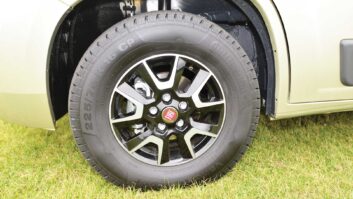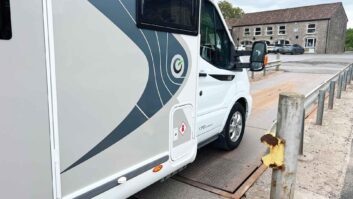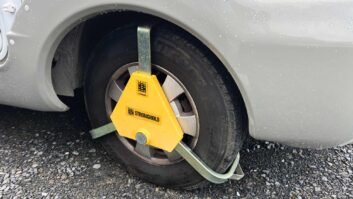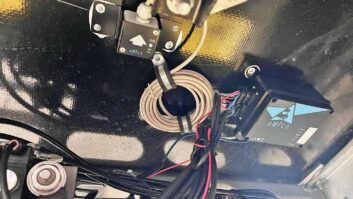You may find yourself wondering why you need a motorhome tracker, but as both the value and the theft of leisure vehicles continues to climb, insurance companies are increasingly requiring the installation of a tracking device. And they often stipulate that these devices must be Thatcham Approved.
But what exactly is Thatcham? How do trackers function? Should you consider installing one? What about resale? And, importantly, what are the costs involved in having one of these motorhome security devices fitted? I’m here to help.
What is a tracker?
Insurance providers typically require a tracker if your motorhome is valued at £50,000 or more. Trackers are compact devices connected to the vehicle’s battery, with a back-up power source.
Hidden within the ’van, they are designed to inform you of its precise location, and alert you to tampering – such as movement without the ignition on – low starter battery levels, and battery disconnection, which can be particularly handy if you’re winterising a motorhome remotely. As a result, it can be easy to see why you need a motorhome tracker fitted.
Insurance providers’ requirements for a tracker vary, but generally depend on the vehicle’s value and its appeal to thieves. Higher-value vehicles often necessitate higher-spec trackers.
Thatcham Approval
Since the 1990s, Thatcham Research has been at the forefront of vehicle safety, security and repair standards. Its categories for immobilisers and alarms help manufacturers to maintain standards and consumers to make informed choices.

Insurers can consult this list of approved devices to verify their performance and compliance with industry standards. Thatcham-approved trackers are remotely monitored, and tampering triggers an alert, often via a call to the registered keeper. This constant vigilance helps provide peace of mind, in much the same way that having the best motorhome wheel clamp can.
What are S5 and S7 categories?
Thatcham categories S5 and S7 differentiate tracker features. Both require subscription to a monitoring service.
S7 is the basic specification. It tracks your vehicle and alerts you to a battery disconnect or unauthorised movement.
S5 is the higher specification. If the motorhome is started without the fob present, an alert is triggered and the control room contacts you immediately. The fob should not be kept with the ’van keys or left inside the vehicle.
S5+ requires the fob to be present to start the vehicle, plus all of the features of S5.
Responding to alerts
Alerts usually come in the form of phone calls from your chosen monitoring company, often with a recorded message. You must confirm the situation with the tracker company.
Note that an alert doesn’t always mean the tracker company will take immediate action, beyond contacting you. It is advisable to check the vehicle’s location via the app or directly with the tracker company. If the alert is a false alarm, no further action is taken.
However, if you confirm something untoward might be happening, the ‘alert’ status will be activated. Be aware, though, that once a tracker is in ‘alert’ mode, access to its location data is blocked, to prevent vigilante action.
I spoke to a few tracking companies about this. GPSBob stated: “This is quite normal and is designed to stop a vigilante response. Often, a vehicle is stolen by an organised gang of thieves and going to find it could be dangerous for the individual. We wish to prevent this risk and instead rely on the authorities to respond.”
Global Telemetrics added, “Owner response can be dangerous. We have an Auto-Crime Repatriation Team, which liaises and works closely with the police. On receiving a crime reference number from our customers, they will head to the location the tracker provides and secure the vehicle until the police arrive.
“Because our team works closely with the police and has established good relationships with forces throughout the UK, we have found this significantly speeds up the ability to recover vehicles quickly and safely for our customers.”
Can tracking devices be detected, or fobs cloned?
It is possible to detect a tracker’s signal, but that won’t necessarily reveal its location. Thieves often leave a stolen vehicle somewhere for a few days to see if it is retrieved, indicating it has a tracker.
Fobs can be cloned, as can vehicle keys working with a start-stop button function. Advanced fobs, such as those from GPSBob, use Time-Based One-Time Password technology, which changes codes every 60 seconds to prevent cloning.
How much does a motorhome tracker cost?
Costs vary widely for trackers, with hardware and installation fees ranging from £75 to £800. Thatcham-approved remote monitoring systems incur additional charges, as a one-off payment or a monthly subscription.
For example, Global Telemetrics charges £149 per year, while GPSBob offers an S7 subscription for £8.99 a month. Choosing a suitable tracker will be determined initially by your insurer’s requirements. You then need to research the best subscription model for your budget.
Resale implications
Most tracking companies allow you to transfer the tracker to another vehicle when you sell and replace it, but check with your supplier first.
For example, Global Telemetrics permits unit transfers unless a lifetime subscription has been paid, while others, such as GPSBob, will allow a subscription to be taken over by the next buyer.
Additional features and benefits of a tracker
Trackers offer various benefits beyond security. One feature I love is that the tracker logs our travel history. Plus, it will alert me to low starter battery voltage. Additionally, having a tracker can reduce your insurance premium, because of the extra protection it offers and the likelihood of the vehicle being recovered in the event of theft.
Planning ahead
Avoid last-minute surprises by checking with your insurer in advance if a tracker is required.
Some listeners to the Motorhome Matt podcast have reported discovering this requirement only after buying a motorhome and when picking up their new vehicle, leading to delays or the need for additional temporary and expensive security measures.
Confirming in advance allows you to arrange installation through your dealer or a tracking company, ensuring the smooth handover and collection of your new leisure vehicle.
You can find out more about me and listen to my podcast at motorhomematt.co.uk
If you’ve enjoyed reading this article, why not get the latest news, reviews and features delivered direct to your door or inbox every month. Take advantage of our brilliant Practical Motorhome magazine SUBSCRIBERS’ OFFER and SIGN UP TO OUR NEWSLETTER for regular weekly updates on all things motorhome related.









